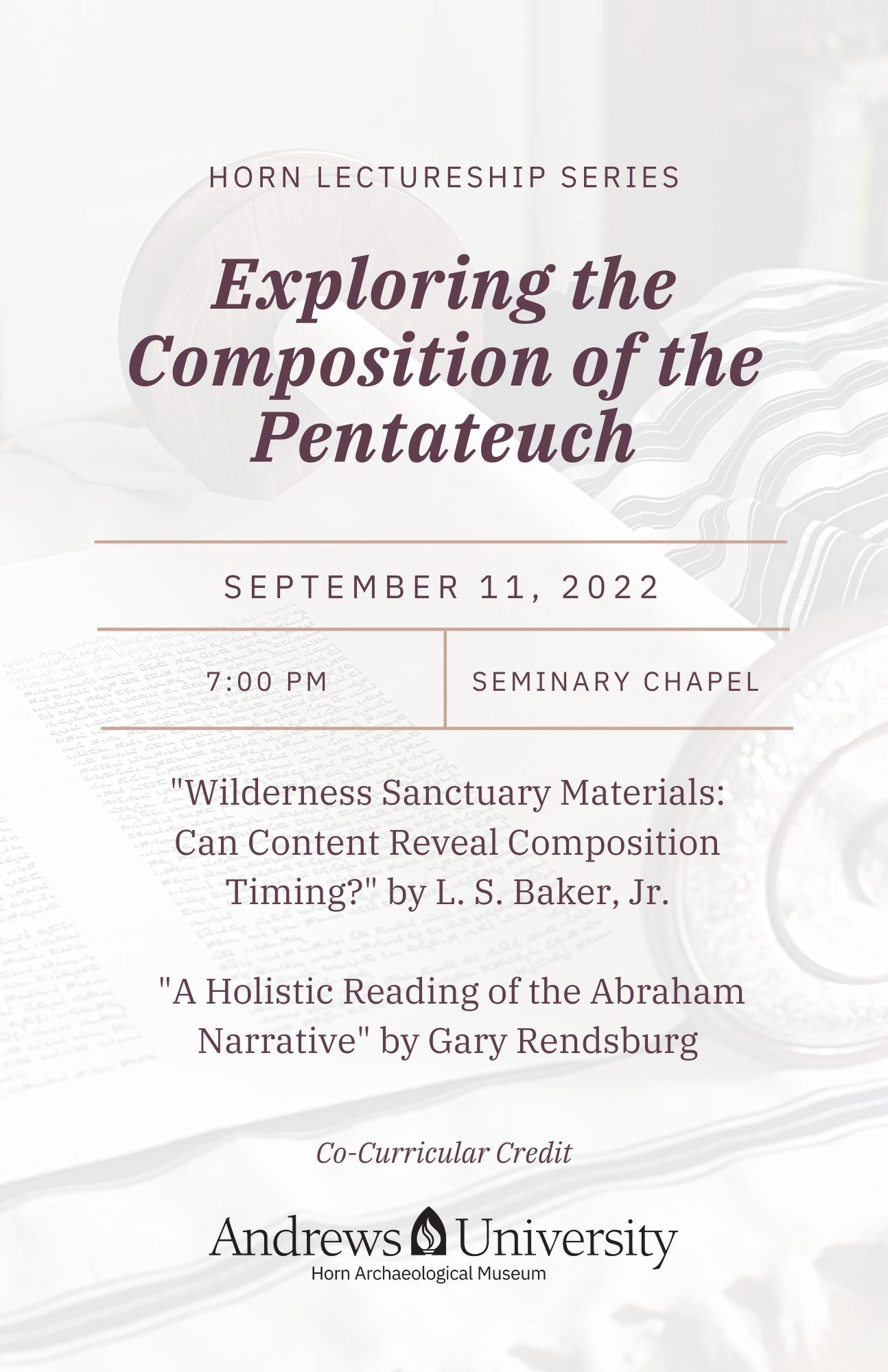The Conceptual and Stylistic Imprint of Deuteronomy on the Narratives of Genesis–Numbers
Presenter Status
Gunther H. Knoedler Professor of Old Testament, Graduate School
Start Date
3-4-2016 6:10 PM
End Date
3-4-2016 7:00 PM
Session
Literary and Historical Studies
Presentation Abstract
The name “Pentateuch” reflects the five-scroll nature of what the Hebrew Bible calls the Torah. Although scholars recognize this to be a high if complex literary achievement incorporating a variety of genres and sources, most agree that the contents were composed as a continuous more or less coherent narrative. If that is the case, then we should not be surprised if the style and perspective of the last scroll (Deuteronomy) flavor the preceding narratives. In some circles critical scholars have dispensed with the documentary JEDP approach and recognized increasingly the deuteronomistic character of the so-called J and E sources (e.g., E. Blum). This study will explore the deuteronomistic elements in the narratives of Genesis–Numbers and inquire what implications the findings may have for the composition of the Pentateuch.
Biographical Sketch
In the summer of 2005 Dr. Block joined the Graduate School faculty of Wheaton College in Wheaton, Illinois, where he serves as the Gunther H. Knoedler Professor of Old Testament. His previous professional experiences include the following: John R. Sampey Professor of Old Testament Interpretation, The Southern Baptist Theological Seminary in Louisville, Kentucky (1995-2005); Professor of Hebrew and Old Testament, Bethel Theological Seminary, St. Paul, Minnesota (1983-95); Assistant Lecturer in Hebrew at the University of Liverpool, England (1978-80); Professor of Old Testament, Providence College and Seminary, Otterburne, Manitoba (1973-83).
Dr. Block's educational background includes post-doctoral studies, Cambridge, University, Cambridge, UK (2002, 2010); D.Phil. in Semitics and Classical Hebrew, University of Liverpool, England (1982); M.A. in Biblical Studies-Old Testament, Trinity Evangelical Divinity School, Deerfield, Illinois (1973); B.A. in History, University of Saskatchewan, Saskatoon (1969); special studies in History of Thought and Culture, Friedrich Alexander University, Erlangen, Germany (1968-69); B.Ed., University of Saskatchewan, Saskatoon (1968); Diploma in Biblical Studies, Bethany Bible College, Hepburn, Saskatchewan (1965).
Dr. Block is the author of more than one hundred scholarly essays and numerous popular articles on biblical texts and subjects. His most significant publications include a major two-volume commentary on The Book of Ezekiel (Grand Rapids: Eerdmans, 1997, 1998), and a weighty commentary on Judges and Ruth (Broadman & Holman, Nashville, 1999), a commentary on Obadiah: The Kingship Belongs to YHWH (2014), and For the Glory of God: Recovering a Biblical Theology of Worship (2014). Other publications include a full length commentary on Deuteronomy (NIVAC, 2012), two volumes of essays on this book, How I Love Your Torah, O LORD! (2011); The Gospel according to Moses (2012); Ezekiel’s Hope: A Commentary on Ezekiel 38-48in conversation with Jacob Milgrom (2012); By the River Chebar: Historical, Literary, and Theological Studies in the Book of Ezekiel (2013); Beyond the River Chebar: Studies in Kingship and Eschatology in the Book of Ezekiel (2013). His new commentary on Ruth: The King is Coming (Zondervan) will appear in the fall of 2015 in the Zondervan Exegetical Commentary on the Old Testament series for which he serves as senior editor). He played a major role in the production of The New Living Translation of the Bible (2004), serving as General Reviewer for Genesis-Deuteronomy and advisor on the book of Ezekiel. He is an active member of the Evangelical Theological Society and the Society of Biblical Literature, and served as President of the Institute of Biblical Research from 2001-2006.
Dr. Block and Ellen, his wife of forty-nine years, are both native to Saskatchewan, Canada. They have two adult children, a daughter Jonelle (married to Douglas Yates), and a son Jason (married to Carolyn Ratzlaff), and six grandchildren.
The Conceptual and Stylistic Imprint of Deuteronomy on the Narratives of Genesis–Numbers
The name “Pentateuch” reflects the five-scroll nature of what the Hebrew Bible calls the Torah. Although scholars recognize this to be a high if complex literary achievement incorporating a variety of genres and sources, most agree that the contents were composed as a continuous more or less coherent narrative. If that is the case, then we should not be surprised if the style and perspective of the last scroll (Deuteronomy) flavor the preceding narratives. In some circles critical scholars have dispensed with the documentary JEDP approach and recognized increasingly the deuteronomistic character of the so-called J and E sources (e.g., E. Blum). This study will explore the deuteronomistic elements in the narratives of Genesis–Numbers and inquire what implications the findings may have for the composition of the Pentateuch.




Images